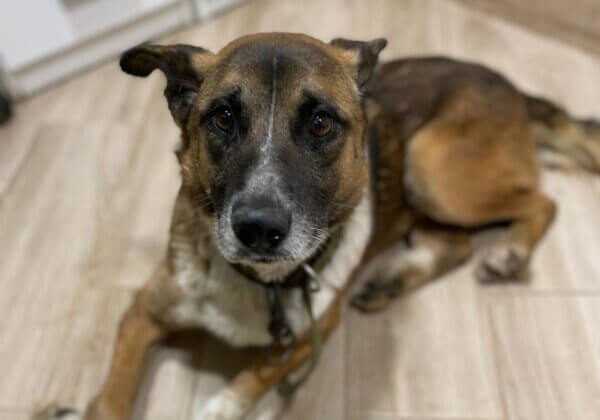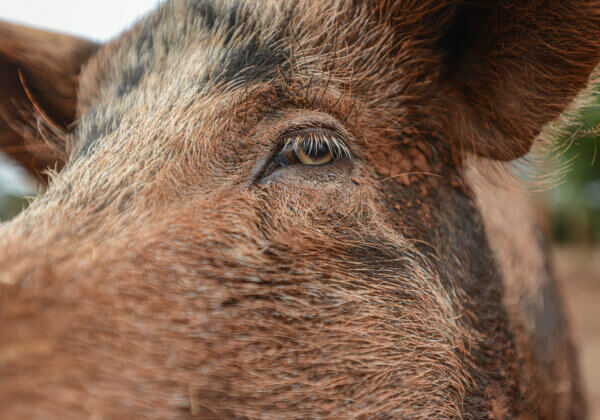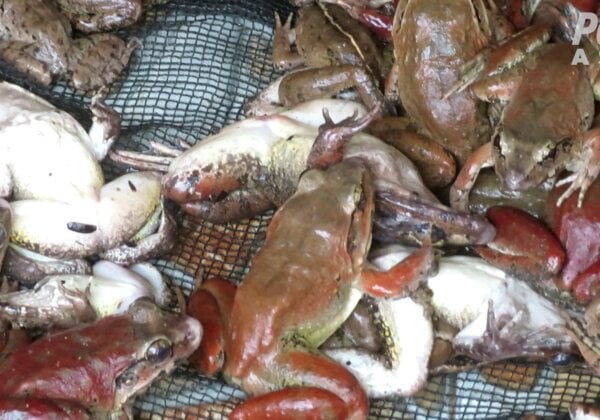PETA’s 2020: How You Helped Us Help Animals
From catastrophic bushfires to COVID-19, 2020 has been a year full of challenges for Australia. Throughout it all, PETA has been unwavering in our mission to advocate for animals and the vegan movement has grown exponentially, as more people make the connection between exploiting animals, environmental devastation, and emerging diseases affecting human health.
Watch this video to see some of PETA’s landmark moments this year:
Preventing Future Pandemics
As COVID-19 gripped the world, PETA exposed the cruelty at live-animal markets like the one where the novel coronavirus first jumped to humans from other animals. PETA Asia investigators found that these markets were operating all over the globe, posing a huge risk to human health, and we lobbied for them to be shut down.
However, since the animals most commonly connected to viral outbreaks are chickens and pigs, PETA protesters also took to the streets of both Brisbane and Sydney dressed in hazmat suits with the message “Prevent Pandemics: Go Vegan.”
We continued to look for new ways to speak up for animals and harness the power of the media to help people make the connection. As Australians started panic-buying toilet rolls, PETA handed out free paper, each sheet printed with the message “Wipe Out Animal-Borne Illness: Go Vegan.” We sent a customised “pandemic puzzle” to Prime Minister Scott Morrison, calling on him to stop eating animals, and we took the vegan message to the skies above polling booths on Queensland’s election day. If people were looking for a sign to stop eating and wearing animals, we sure gave it to them!

Ending the Experiments
In 2020, new cosmetics testing laws came into force in Australia and the Chinese government took steps towards loosening requirements for cosmetics tests, potentially sparing countless animals the agony they endure when substances are dripped into their eyes and rubbed onto their skin.
After hearing from PETA and our affiliates, pharmaceutical companies Bristol Myers Squibb and GlaxoSmithKlineconfirmed that they would stop using the forced swim test – a widely discredited experiment in which terrified mice, rats, and other small animals are dropped into inescapable beakers of water for the sake of watching how long they struggle. The University of Adelaide also confirmed it would stop allowing this cruel test. These victories will spare hundreds of thousands of mice, gerbils, hamsters, rats, and guinea pigs the panic and terror of this useless experiment.
Making a Case Against Cruelty
After a two-year investigation by officials, a shearer in Victoria faced court and pleaded guilty to cruelty to animals. PETA released the footage which prompted the charges, once again exposing the wool industry’s systemic and pervasive cruelty towards sheep. The precedent-setting case sends a strong message to animal abusers: your actions have consequences!

Helping Animals Keep Their Skin
A landmark PETA exposé of the alpaca trade revealed that crying alpacas were slammed onto tables and tied into stretching devices, which nearly wrenched their legs out of their sockets. Terrified of being pinned down, the animals spat, cried out, and vomited as they were roughly shorn and then thrown to the floor. PETA and our international affiliates have since persuaded Valentino, Columbia Sportswear Company, UNIQLO, Marks & Spencer, and Smith & Caughey’s to ban alpaca.
We also pressured beauty giants Sephora, MECCA, and Velour to ditch cruelly obtained mink fur for eyelashes, almost decimating the fur eyelash industry.
Prada and Paul Smith announced they would stop using kangaroo leather, and PVH Corp. – the parent company of Tommy Hilfiger, Calvin Klein, and others – and Mulberry dropped exotic skins.
We released an investigation into the global leather trade and showed Australians that animals abused in the live-export industry could end up as the leather handbags, boots, and belts in their closet.

Breaking the Shackles
Fantastic news for camels and horses in Egypt! After pressure from PETA, our affiliates, and nearly half a million supporters like you, the Egyptian government announced plans to ban camel and horse rides at Giza’s top tourist attractions. Animals there will no longer be forced to haul tourists around in the scorching heat.
These days, we have scores of better ways to get around and entertain ourselves, and tourists will travel to pyramids and other notable sites in electric cars and buses.
Fighting Climate Change With Diet Change
In early 2020, Australia was burning. The bushfires that had already been raging for months had intensified, and animals – from wildlife to lambs and cows trapped on farms – were suffering and dying. In Sydney, PETA held a vegan barbecue to raise money for emergency relief efforts while also raising awareness of the link between animal agriculture and climate change – which scientists confirmed was a key factor in the severity of the fires.
Vegan Went Mainstream (Not Just Food!)
Year after year, vegan food has seen exponential growth in Australia. In 2020, PETA had a hand in helping companies like Nando’s, UP&GO, The Cheesecake Shop, and Fergusson Plarre get their vegan groove on.
The biggest shift, though, has occurred in fashion. In June, we coordinated a billboard blitz across Sydney that asked shoppers to “Wear Vegan”, and around 400 companies were added this year to the “PETA-Approved Vegan” list. HUGO BOSS created its first completely animal-free suit, MIMCO launched vegan apple peel leather bags, and Cotton On Group released its first line of vegan footwear.

Get Loud for Animals
Through our protests, groundbreaking exposés, and viral social media posts, PETA helped Australians understand that animals are individuals who should never, ever be exploited.
The harm that speciesism can cause to our world was made abundantly clear in 2020. From a deadly zoonotic virus to devastating fires fuelled by climate change, we saw that exploiting animals has apocalyptic consequences.
In response, a movement for kindness is taking root. PETA is proud to be a voice for change, and we will stay loud until every cage is empty, every chain is broken, and every animal is treated with respect.
Will you join us in 2021?







